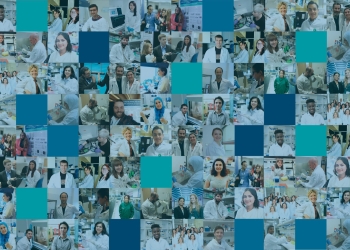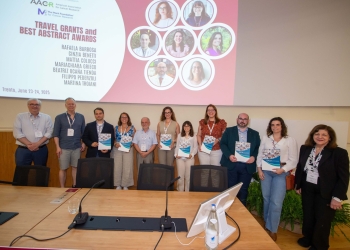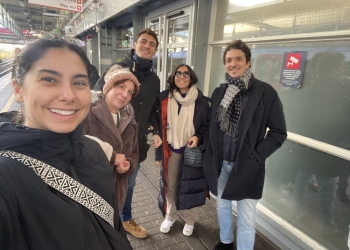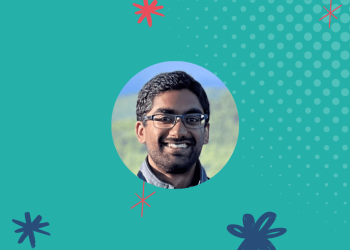Ana Bárbara de Sousa Carreira is an EACR Travel Fellowship recipient who returned from Tel Aviv University in Israel in August 2022.
The EACR has joined forces with Worldwide Cancer Research to provide Travel Fellowships of up to €3,000 to enable early-career cancer researchers to gain new skills through a short-term visit to a lab or research group in another country.
You can read about other Travel Fellowship awardees and their experiences here.

Name: Ana Bárbara de Sousa Carreira
Job title: PhD student
Home institute: University of Lisbon, Portugal
Host institute: Tel Aviv University, Israel
Dates of visit: 01 June – 20 August 2022
Research: I am currently developing a precise nanovaccine that is capable of successfully educating the cells of our own immune system to specifically recognise and destroy melanoma cells. The final goal is to be able to eliminate the tumour cells before they reach the brain, preventing the appearance of melanoma brain metastases, that currently have a high mortality rate with no effective treatments.
Why did you decide to apply for an EACR Travel Fellowship?
To be able to travel and do my research at the Tel Aviv University, I needed support that could help fund me during my stay. After my supervisor, Prof. Helena Florindo, told me about the EACR Travel Fellowship, I read through some feedback of previous Travel Fellows and realised that this would be the perfect opportunity for me. My purpose was to learn new methodologies and techniques that would both help advance my own research and be brought back to my home lab, thus improving the current research that we do.
Why did you choose the host lab?
Prof. Ronit Satchi-Fainaro and Prof. Helena F. Florindo are long collaborating labs with several successful and ongoing research projects. Since the beginning of my PhD, I knew that I wanted to go to Prof. Ronit Satchi-Fainaro’s lab in order to improve my research knowledge in immunocompetent mouse models used to assess the anti-tumour effect of new nanomedicines.
“It was brilliant to work with such outstanding young researchers”
Can you shortly summarise the research you did and what you learned on your visit?
During my time in the host lab, I was able to test the anti-tumour activity of my therapeutic precise nanoparticle against melanoma brain metastases, using two different immunocompetent mouse models. I used a spontaneous brain metastases mouse model, where I injected tumour cells intracardiac and waited for the mouse to develop spontaneous melanoma brain micrometastases.
I also used a non-spontaneous mouse model, where the melanoma cells were directly injected into the brain. During these experiments, I was able to follow and measure the development of the brain metastasis by MRI analysis, a new technique that I learned and that currently I cannot do at my home lab. The MRI allowed me to perform a survival study, crucial to show the benefit of the precise nanovaccine that I developed over the current available immune checkpoint therapies.
Moreover, it was also possible to do histology analysis of brain tissue, another technique that I learned during my stay.

Did you have a personal mentor or anyone who particularly helped you?
I had the opportunity to work alongside three very talented PhD students, Ron Kleiner, Sabina Pozzi, and Daniella Vaskovich. They were all very patient with me, teaching me all the new techniques that I learned during my stay. It was brilliant to work with such outstanding young researchers.
Prof. Ronit Satchi-Fainaro, the head of my host lab, was also very helpful and always
available to discuss my research ideas and my results, guiding me on the right path with her exceptional knowledge. Besides all the help in the lab, Ron was also a very helpful tour guide, showing me all the interesting places and local food in Tel Aviv.
Does your lab plan to do any future collaborations or publications with the host lab?
During my time in the host lab, we submitted a manuscript of work developed by the two
labs regarding a nanovaccine for COVID-19, that is now currently in review. We are also planning to submit two more manuscripts soon, one on a triple negative breast cancer nanovaccine and another related to my own research on melanoma brain metastases. After this short visit, I am very eager to go back to this extraordinary work environment, in order to continue to strengthen the collaboration between the two labs, and to further my development as a researcher.
Want to find out more?
If you are interested in applying for the Travel Fellowship scheme, please click here for more information: EACR Travel Fellowships.










